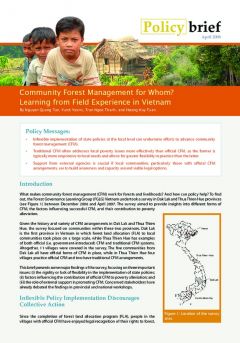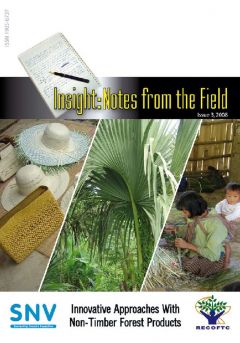Location
RECOFTC
RECOFTC is derived from an abbreviated form of the organization's legal name, Regional Community Forestry Training Center for Asia and the Pacific. Formerly the organization was known as RECOFTC – The Center for People and Forests.
RECOFTC – The Center for People and Forests is an international not-for-profit organization that focuses on capacity building for community forestry in the Asia Pacific region. It advocates for the increased involvement of local communities living in and around forests - some 450 million people in Asia-Pacific - in the equitable and ecologically sustainable management of forest landscapes.
The Regional Community Forestry Training Center for Asia and the Pacific (RECOFTC) opened in Bangkok, Thailand, in March 1987 with support from the United Nations Food and Agriculture Organization, the Government of Switzerland (through the Asian Development Bank), and Thailand's Kasetsart University.
Community forestry is widely acknowledged as a powerful solution for many of the challenges facing local people and the wider society, especially in improving rural livelihoods, enhancing community governance and empowerment, transforming forest-related conflict, protecting and enhancing the environment, and helping to fight climate change. As a capacity-building organisation, RECOFTC improves the ability of people and organisations to conduct community forestry effectively and sustainably.
RECOFTC works toward its mission through four thematic areas:
- expanding community forestry
- people, forests and climate change
- transforming forest conflict
- securing local livelihoods.
Members:
Resources
Displaying 436 - 440 of 485Pro-poor Payment for Environmental Services: Some Considerations
PES is a new concept gaining momentum in the Asia-Pacific region. But what are the enabling conditions for employing PES schemes, and how can they be made pro-poor? Payment for Environmental Services (PES) sets up systems where beneficiaries of environmental services reward the providers of such services with payments or other non-financial goods (market access, land security, public services, infrastructure, capacity building).
Illegal Logging: Current Issues and Opportunities for SENSA/SIDA Engagement in Southeast Asia
Illegal logging and its associated trade remains a serious threat to forests and people in Southeast Asia. However, despite having caught the attention of the international community more than a decade ago, the illegal timber trade still accounts for a significant portion of wood and wood products from this region.
Community Forestry Management for Whom? Learning from Field Experience in Vietnam
The Forest Governance Learning Group (FGLG) Vietnam undertook a survey in Dak Lak and Thua Thien Hue provinces between December 2006 and April 2007. The survey aimed to provide insights into different forms of community forest management, the factors influencing its success, and their contribution to poverty alleviation.
Community Forestry Management for Whom? Learning from Field Experience in Vietnam
The Forest Governance Learning Group (FGLG) Vietnam undertook a survey in Dak Lak and Thua Thien Hue provinces between December 2006 and April 2007. The survey aimed to provide insights into different forms of community forest management, the factors influencing its success, and their contribution to poverty alleviation.
Insight: Notes from the Field, Issue III - Innovative Approaches with Non-Timber Forest Products
Debate over the potential of NTFPs for achieving ecosystem conservation and poverty alleviation has grown in the past decade. Concern has been raised that NTFP activities may not always provide the poor with the expected benefits, and could in some cases even act as a poverty trap (see discussion in Overview paper). Considering these concerns, the objective of this publication is to share experiences on how innovative approaches have led to successful outcomes such as increased access of poor forest dwellers to resources and markets, increased participation, and benefit sharing.





